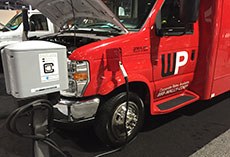Electric Vehicle Conversions
Although uncommon, a conventional vehicle can be converted to an all-electric vehicle. Such conversions provide options beyond what is available from original equipment manufacturers (OEMs). Certified installers can economically convert heavy-duty vehicles to operate on electricity alone or to improve the efficiency of conventional vehicle designs.
See the conversions page for information on regulations and standards that apply to vehicle conversions.
Vehicles that have a gross vehicle weight rating of less than 10,000 pounds, use more than 48 volts of electricity, and have a maximum speed greater than 25 miles per hour must meet Federal Motor Vehicle Safety Standard 305, Electric Powered Vehicles: Electrolyte Spillage and Electrical Shock Prevention.
All-Electric Vehicle Conversions
Although uncommon, a vehicle with an internal combustion engine can be converted to an all-electric vehicle by completely removing the engine and adding a battery pack, one or more electric motors, high-voltage cables, and instrumentation. Careful consideration should be given to the space available to package added batteries and electric motors, along with the ability of the original chassis to support the added weight and placement of those components while still meeting requirements for emissions and crashworthiness.
Neither EPA nor California Air Resources Board (CARB) require that EV conversions be certified, as long as the conversion does not add a device that produces fuel combustion emissions. Motiv Power Systems provides OEM factory products, electric vehicle chassis, and vehicle repower options.
